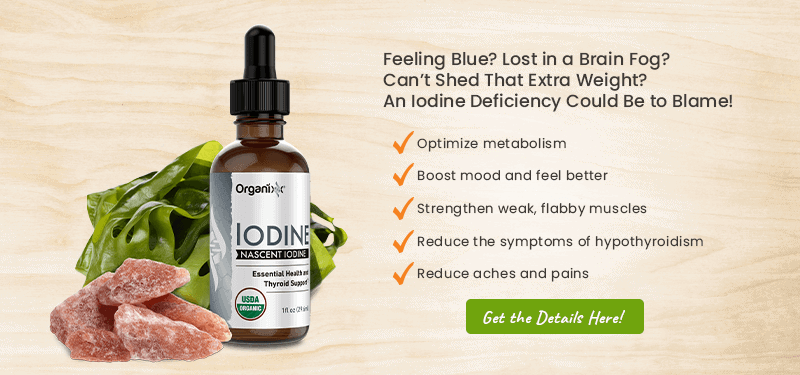Did you know that, according to leading experts, over 90% of the U.S. population is iodine deficient [1]? This means the odds are that you are too, especially if you suffer from one or more of the many common iodine deficiency symptoms listed below. Read on to discover what iodine deficiency is and what you can do about it.
Interesting Facts About Iodine

Iodine was “discovered” as a new element quite by accident back in 1811 during the Napoleonic Wars. A few years later, it was being used both orally as well as topically as an antibiotic [2].
Iodine was also the very first medical treatment used for a single condition: goiter. Still today, in conventional medicine, povidone iodine continues to be used topically before and after surgery to prevent infection.
Every Cell in Your Body Uses Iodine
Iodine is an essential micronutrient with every cell in the body requiring iodine to function optimally [3]. It is especially vital for the thyroid which uses the most iodine.
In men, the reproductive system and the prostate also contain large amounts of iodine. In women, after the thyroid it is found most in the ovaries, followed by the breasts and uterus.
All hormone-producing glands in both men and women contain a lot of iodine. This is why for years iodine was used as a “hormonal tonic.” For women, it was used for conditions such as amenorrhea [4] and easing the transition into menopause. For men, it was used for helping with prostate conditions.
How Would You Identify an Iodine Deficiency? 8 Signs of Iodine Deficiency
The body as a whole can hold up to 1500 milligrams of iodine and the thyroid alone can hold up to 50 mg. These stores have to be constantly replenished on a daily basis. When they’re not, a person can develop many kinds of iodine deficiency disorders [5].
These 8 signs & symptoms may be indicators of an iodine deficiency in you or a loved one:
- an inability to lose weight
- mental illness, including anxiety, depression, or bipolar disorder
- mood swings
- hormonal imbalances
- heart arrhythmias
- hair loss
- cold hands and feet
- low body temperature

Low body temperature, including in the hands and feet, is especially important to note if you are considering whether you are iodine deficient or not [6].
Low body temperature can be serious not just because it is associated with low iodine and thyroid issues. Most individuals diagnosed with cancer also tend to have low body temperature [7]. People with iodine deficiency have a higher risk of cancer overall.
Iodine Deficiency Is Especially Serious for Women Who May Become Pregnant
A 2019 published review by researchers from the College of Health Sciences at Texas Woman’s University [8], emphasized that iodine deficiency can have severe consequences for women who are or may become pregnant.
This is because an iodine deficiency in the mother can lead to irreversible brain damage in the fetus. According to the researchers:
“Iodine deficiency disorders (IDD) comprise a range of adverse maternal and fetal outcomes, with the most significant irreversible effect resulting from neurodevelopmental deficits in fetal brain caused by deficient iodine status during early pregnancy.”

The researchers also noted in their findings that public awareness about iodine deficiency in women who plan to become pregnant is “severely lacking” and that lack of awareness extends to many healthcare providers.
“Over 75% of obstetricians and midwives do not recommend iodine supplementation to patients planning to become pregnant, during pregnancy, or lactation despite the deleterious effects of iodine deficiency in women of reproductive age.”
Iodine Receptor Sites Are Easily Blocked
One reason for iodine deficiency is that most people are not consuming enough iodine-rich foods. Another key reason why Americans as a whole are deficient in iodine is because so many of us carry around a large toxic load, especially of chemicals called halogens.
Iodine itself is an essential element that can be found in the halogen grouping on the periodic table of elements. Other halogens near it on the table include chlorine, bromine, and fluorine.
Why are the other halogens so damaging to our health? It’s because when ingested into the body, they replace iodine in all-important receptor sites in the thyroid and also in the reproductive organs in both men and women.
Chlorine, Fluorine & Bromine Crowd Out Iodine in the Body
When seen under a microscope, you will find that iodine actually has the biggest mass of all of the halogens. This means that cellular receptor sites for iodine in the body are big as well. However, even the smallest of the invasive halogens – fluoride – can take up enough space in these sites so that iodine cannot land.

Chlorine and/or fluorine (fluoride) can be found in many municipal water supplies (i.e. the water that comes out of your tap) as well as swimming pools and hot tubs.
Bromine has been proven in multiple studies to be cancer-causing. It is an endocrine disruptor and various forms of it can be found in many consumer products, such as plastics, paints, new carpets, and even mass-produced pastries and bread [9].
What to Do If You Suspect an Iodine Deficiency
If you have iodine deficiency symptoms (or otherwise suspect you’re iodine deficient), the first way to turn your iodine deficiency around is by limiting your exposure to halogens that compete with iodine. This means chlorine, fluorine, and bromine.
The next is to get your iodine levels tested by a trusted and knowledgeable healthcare practitioner. If you are subclinically to severely iodine deficient, then taking a quality iodine supplement is likely a necessary next step.
When your organs are working hard to detoxify, you want the purest form of iodine possible to help them work more efficiently. It only makes sense to use an organic form that’s totally natural and free of chemicals. Organixx Iodine is one of the only formulas that is USDA Certified Organic. It’s a pure, nascent form of iodine which your thyroid can use immediately.




